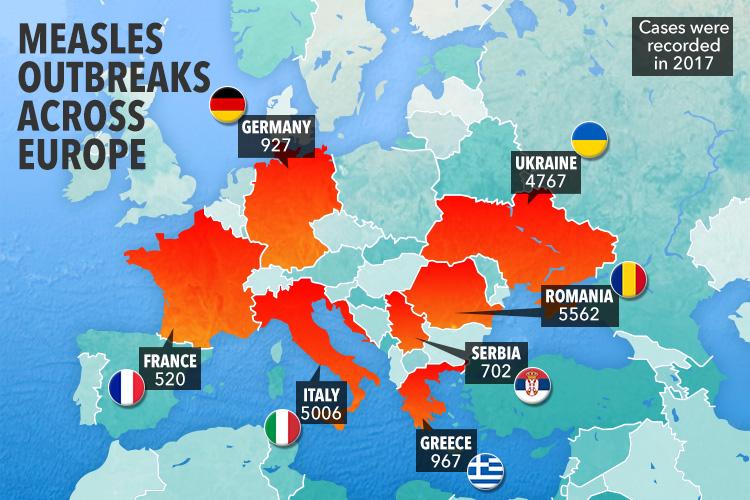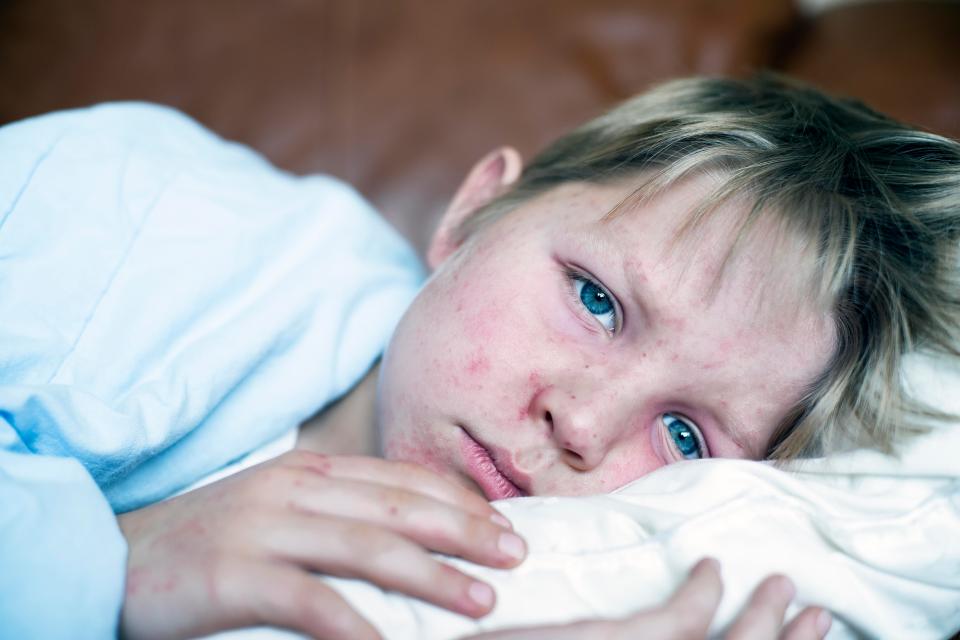Measles outbreak reaches more than 20,000 in Europe after parents shun vaccination, health experts warn

HIGHLY contagious measles outbreaks reached more than 20,000 across Europe last year after parents shunned vaccinations, health experts have warned.
The large-scale outbreaks occurred in countries where vaccine uptake was low or vaccine supplies were interrupted, according to the World Health Organisation (WHO).
Measles is highly contagious disease that can be prevented by having the vaccination, offered by the NHS as a single measles, mumps and rubella jab.
But last year cases across Europe spiked 400 per cent with 21,315 people affected and 35 people killed following a record low of 5,273 cases in 2016.
In 15 parts of the continent vaccination rates are falling behind and disease surveillance systems are under performing, the agency warned.
Of the cases recorded, 19,100 were recorded in eight of those 15 countries - Romania, Italy, Ukraine, Greece, Germany, Serbia, Tajikistan and France.
Dr Zsuzsanna Jakab, the WHO's regional director for Europe, said: "Every new person affected by measles in Europe reminds us that unvaccinated children and adults, regardless of where they live, remain at risk of catching the disease and spreading it to others who may not be able to get vaccinated.
"Over 20 000 cases of measles, and 35 lives lost in 2017 alone, are a tragedy we simply cannot accept.
"Elimination of both measles and rubella is a priority goal that all European countries have firmly committed to, and a cornerstone for achieving the health-related sustainable development goals.
"This short-term setback cannot deter us from our commitment to be the generation that frees our children from these diseases once and for all."
Measles is a highly infectious viral illness that can be very unpleasant and sometimes lead to serious complications.
It's now uncommon in the UK because of high vaccination rates although last year there were 282 cases of the disease recorded in the UK, according to WHO.
HEALTH CHECK What is measles, can you get it if you’ve had the MMR vaccine, what are the symptoms, is there a rash and can you catch it twice?
As a result of vaccination rates it is unlikely a widespread outbreak will happen, but smaller, localised cases could happen in parts where large numbers of kids and babies have not had their vaccine.
Anyone can get measles if they haven't already had it, but it is more common in young children.
It starts with cold like symptoms before a rash develops a few days later.
The rash looks like small, red-brown blotches and can make a person feel very unwell.
WHY COULD YOU BE AT RISK?
FOR the majority of people in the UK, measles does not pose a risk.
That's because most people will be immunised against the disease, having been given the vaccine as a child.
But, there remain some people who are not protected.
There has been some controversy about whether the MMR (measles, mumps and rubella) jab - included as part of the NHS childhood immunisation programme - might cause autism.
The controversy led to some parents refusing to have their babies vaccinated.
Doubts were raised following a 1998 study by Dr Andrew Wakefield.
In his paper, published in The Lancet journal, he warned of a link between the combined jab and autism or bowel disease.
But, his work has since been discredited, and he was struck off as a doctor in the UK.
More recent studies have found no link between the jab and autism or bowel disease.
Source:
Severe complications can occur, including miscarriage in pregnant women, brain swelling and the risk of death from pneumonia.
The virus is spread through coughing and sneezing and through close contact with infected individuals.
The biggest outbreaks recorded last year were in Romania and Italy.
Romania recorded 5,562 cases and Italy had some 5,006 cases.
The WHO has previously warned that measles is still regularly found in certain areas of the world and it can spread to any country, including those that have eliminated the disease.
Every un-immunised person, regardless of their age, is at risk of contracting the disease, especially in countries with low immunisation rates.
MORE ON MEASLES
The measles, mumps and rubella vaccination is given as part of the routine NHS childhood vaccination programme.
One dose is usually given to a child when they're 12-13 months old and a second dose is given before they start school, usually between three and five years old.
You or your child can be vaccinated at any point if you haven't been fully vaccinated before.
If you're not sure whether you were vaccinated in the past, having the vaccine again won't cause any harm, says the NHS.
We pay for your stories! Do you have a story for The Sun Online news team? Email us at tips@the-sun.co.uk or call 0207 782 4368













